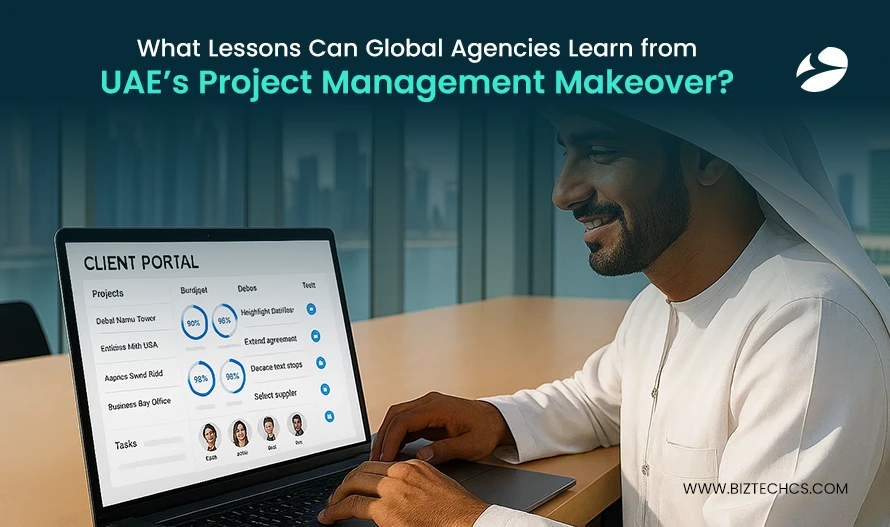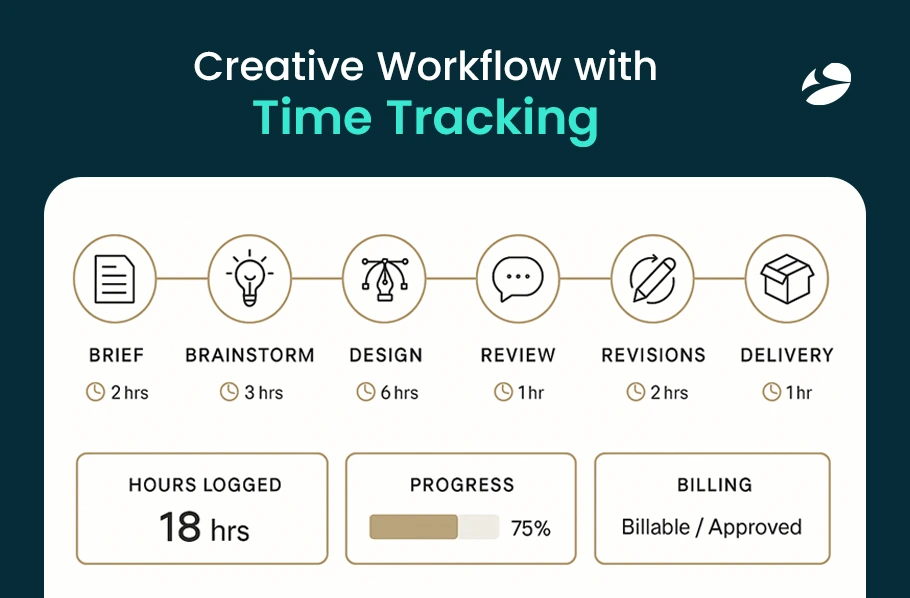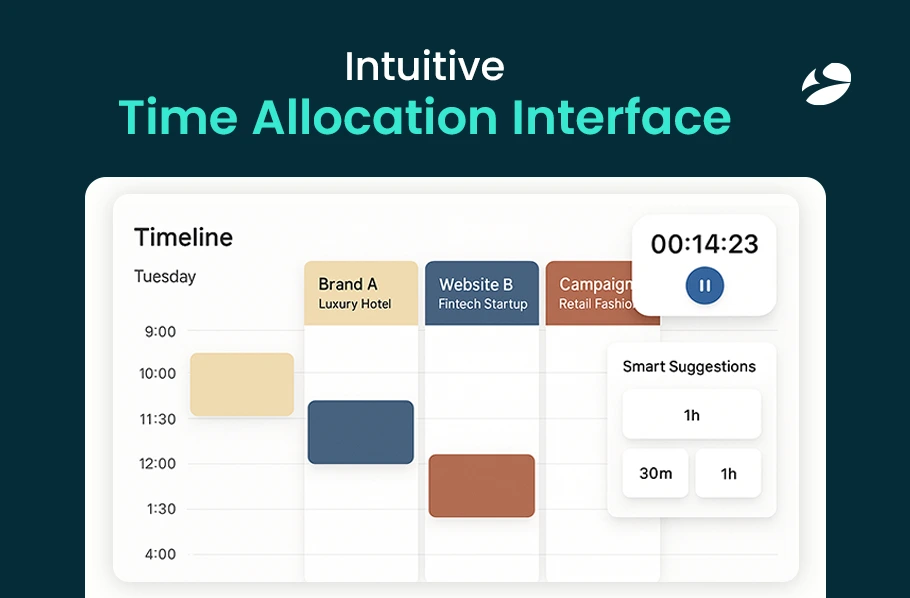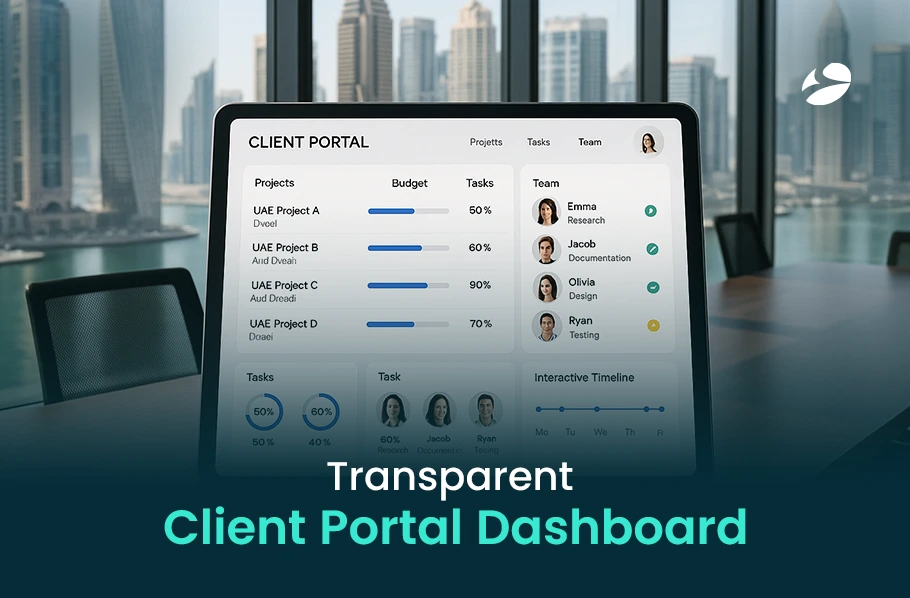170
What Lessons Can Global Agencies Learn from UAE’s Project Management Makeover?
5 min read
170
5 min read
Table of Content

Creative agencies in the UAE are masters of the big idea. From iconic rebrands to viral campaigns, they bring brands to life with flair and precision. But behind the scenes, the story is often very different.
Take, for example, a Dubai-based agency that just delivered a striking rebrand for a luxury hotel chain. The visuals are sharp. The messaging? Spot on. The client is thrilled. The creative director is basking in praise—the account manager’s practically a hero.
And the finance department? They’re buried in chaos.
Timesheets are scattered. Task logs are incomplete. Designers log hours three weeks late—if at all. It’s less financial reporting and more forensic excavation. Reconstructing a three-month timeline feels like dusting off ancient ruins.
If that sounds all too familiar, you’re not alone. This disconnect between creative output and operational control is widespread in the UAE’s creative sector. While agencies thrive on bold ideas and compelling narratives, their project management systems often lag behind, held together by sticky notes, color-coded spreadsheets, and sheer willpower.
It’s not a question of talent. It’s a structural gap. The creative brilliance is there, but the backend—billing, timelines, approvals—is often treated as an afterthought.
As one creative director put it, “We’re great at creating campaigns, but why does our billing process feel like archaeology—digging through layers of forgotten hours and missing tasks?”
The answer lies in how most agencies are set up. Traditional ERP systems are built for industries like manufacturing or IT, where work follows linear timelines and predictable workflows. But creative work doesn’t happen that way. It unfolds in bursts, loops, and iterations.
That’s why leading UAE agencies are now shifting toward creative-first project management tools—systems designed with the unique rhythm of creative work in mind.
In such situations, BiztechCS can implement Odoo in a way that respects the creative process, tracking task activity in real time without burdening teams with manual entry. When a designer toggles between three concepts before lunch, Odoo intelligently suggests how time should be allocated based on task history and project milestones. Billing becomes accurate and automatic—no more guesswork or retroactive logging.
The results? Finance teams regain control. Clients get transparent breakdowns. And creatives stay in their flow.
This transformation isn’t just about technology—it’s about empathy. Agencies are finally embracing tools that respect how creative teams actually work. They’re bridging the gap between artistic vision and operational clarity.
In a competitive market like the UAE, that shift is more than welcome—it’s essential.
Many creative agencies still juggle a patchwork of disconnected tools—Slack for communication, Trello for task management, Google Sheets for time tracking, and separate invoicing platforms.
This fragmentation often leads to what we call “creative billing syndrome.” Exceptional work goes out the door, but the financial foundation starts to crumble. Project managers lose visibility into the gap between quoted and actual hours, account teams struggle to justify scope changes, and finance departments are forced into reactive firefighting.
But there’s a smarter way. When agencies implement integrated project management and billing systems, the impact is transformative. Experts report agencies typically see a 40–60% reduction in billing disputes and around 25–30% improvement in project profitability within the first quarter (source). This isn’t just speculation—it’s backed by ERP research showing how unified systems can streamline invoicing, time tracking, budgeting, and profitability analysis all in one place.
What the Data Tells Us About Project Management in Creative Teams
The numbers don’t point to a lack of tools—they reveal the untapped potential of using the right ones.
What does this tell us? The need for structured systems isn’t the challenge—adoption and creative alignment are. Agencies don’t struggle because they lack access to tools, but because most tools aren’t built for the way creative teams actually work. And that’s where the gap lies.
Before software comes structure, and the first real step is understanding how creative work flows. Unlike manufacturing or IT development, creative projects don’t run in straight lines.
They move in loops: concept → feedback → revision → approval → refinement. It’s iterative, collaborative, and rarely predictable.
That’s precisely the realization one Dubai-based branding agency came to when they reached out to BiztechCS. With 40 creatives working across multiple client campaigns, their biggest struggle wasn’t talent—it was time. Billable hours were slipping through the cracks, approvals were buried in endless email threads, and creatives viewed time tracking as a form of creativity surveillance.
They didn’t need a rigid system. They needed a framework that respected their rhythm.
In scenarios like this, BiztechCS can step in with not just software, but a reimagined workflow designed specifically for creative teams. Odoo Projects can be configured with custom stages that align with your creative process:
One concern the team had was how the system would handle the nuance between internal revisions and client-requested changes, especially when billing was involved. Could it tell the difference?
This is where deeper customization becomes valuable. BiztechCS can configure approval logic to automatically categorize time based on intent:
Client-requested revisions were tagged as billable, internal refinements were marked as non-billable, and out-of-scope additions triggered alerts for client approval before work continued.
This kind of intelligent time mapping didn’t just streamline tracking—it eliminated arguments over hours and improved billing accuracy. The Dubai agency achieved real results: a 38% decrease in project overruns and invoicing that was completed 45% faster.
More importantly, the creative team didn’t resist the change. They embraced it because the system felt like collaboration, not compliance.
As the agency’s Creative Director put it, “BiztechCS didn’t just implement software. They redesigned our process to match how we actually work. For the first time, our billing supports creativity instead of disrupting it.”
This approach isn’t limited to a single agency or region. Agencies operating in similar conditions—across borders and project types—can experience a similar transformation by aligning approval-based billing logic with their workflow needs. By setting up approval-based billing logic and customizing workflows to match their specific project cycles, they saw their billable hour accuracy increase from 72% to 94% in just one month.

For agencies in the Middle East that operate across borders and time zones, these kinds of adjustments can have an even greater impact. In fact, for UAE teams managing international clients, we often configure project dashboards to reflect client-specific working hours and automate status updates based on time zone alignment. It’s a small change that has a dramatic impact on communication and helps prevent project delays.
So, if you’re thinking about mapping your creative workflows without disrupting your team’s flow, know this: BiztechCS maintains a 94% creative team satisfaction rate because we design systems that work with creativity, not against it.
Traditional time tracking fails in creative environments because it assumes people work in linear, uninterrupted blocks. But designers don’t operate like that. They jump between ideas, iterate on feedback, collaborate in real time, and refine until it feels right. Trying to force rigid time logs onto this kind of flow only creates friction—and frustration.
The solution isn’t stricter rules. It’s smarter systems that reflect how creative minds actually work.
Timesheet automation software becomes powerful when it’s designed around creative workflows rather than just administrative checkboxes. That’s exactly what leading UAE agencies are doing—bringing in tools that align with creative rhythm instead of disrupting it.
Here’s how they’re making time tracking smarter, faster, and more accurate:
One designer at a Dubai studio put it best: “What if I’m working on three projects in one morning? Am I supposed to time each switch like a stopwatch?”
That kind of real-world concern is exactly what we solve for. With BiztechCS’s Odoo implementation, creative teams don’t have to micromanage time logs. Instead, they use a Creative Session Tracker—a drag-and-drop interface that allows them to easily assign blocks of time across multiple projects.
Worked on Brand A for 45 minutes, then switched to Website B for 30, and wrapped up with Campaign C for an hour? Simply allocate your morning session across those three project tiles, and the system handles the math. Even better, it suggests allocations based on your active tasks, calendar events, and current priorities.
As one design lead shared, this single feature saved their team two hours per week in admin work—time they could reinvest in concepting and collaboration.
Modern ERP systems, such as Odoo, are finally catching up to creative realities. With the right configuration, time tracking doesn’t have to feel like a chore—it becomes part of the creative workflow itself.

Creative agencies in the UAE face unique operational challenges. Unlike single-focus service businesses, their campaigns often span multiple deliverables, each with its own timelines, billing models, and reporting requirements. A single client engagement could involve:
Each of these service lines requires a different approach to project tracking, resource allocation, and client billing. What works for social media scheduling may not be suitable for a branding workshop or live activation rollout. The challenge? Implementing systems that can manage this complexity—without burdening the creative teams who need simplicity to stay productive.
That’s why getting your ERP configuration right matters. For example, one often-overlooked move that creates immense downstream value is aligning your time tracking categories with your accounting team’s service classifications. By doing this, you create a clean flow of data between project management and finance—making month-end reporting seamless, not stressful.
A Qatar-based digital agency experienced this firsthand. After partnering with BiztechCS, they implemented a customized time tracking and reporting workflow that matched their unique mix of services. The results were precise: an 87% improvement in project tracking accuracy and 60% faster monthly reporting cycles.
“Before BiztechCS, our project teams spent too much time on administrative tasks,” said the agency’s Operations Manager. “Now, our systems handle the complexity behind the scenes, so our creatives can focus on what they do best. Automated reporting has been a game-changer for our client relationships.”
And for agencies operating in the GCC, regulatory alignment is non-negotiable. Our specialized team has configured Odoo for over 50+ UAE creative agencies, ensuring time tracking and invoicing remain
fully VAT-compliant—all while preserving the flexibility creatives need to do their best work.
The moment of truth for any creative agency: Converting recorded time into client invoices. This is where most agencies face their biggest operational challenge. Creative work involves subjective quality discussions, scope evolution, and iterative feedback cycles that traditional billing systems can’t handle.
Consider a typical scenario: A Dubai marketing agency quoted 120 hours for a comprehensive brand campaign. Midway through the project, the client requests additional social media assets “similar to what we discussed.” The creative team delivers exceptional work, but the final invoice shows 180 hours. Client disputes arise: “We never approved these extra hours.”
This scenario costs UAE agencies millions of dollars annually in disputed invoices, delayed payments, and damage to client relationships. The solution isn’t better contracts. It is transparent, real-time project visibility.
BiztechCS can provide billing transparency solutions that bring real-time visibility into client collaboration—a growing standard in the UAE’s creative sector.
Agencies are no longer just delivering assets—they’re delivering ongoing visibility into how work progresses, how budgets are used, and how scope evolves.
Real-Time Client Portals: Clients access live project dashboards showing:
But with visibility comes the need for structured change management—especially when creative work expands beyond the original scope.
Scope Change Management: Built-in workflows for scope modifications:
Smart Invoicing: Invoices are automatically generated with:
This framework works seamlessly for most project-based clients—but many finance managers raise concerns about how it handles retainer-based billing, especially when clients run multiple projects at once.
For instance, if a client has a 40-hour monthly retainer, how do you track those hours fairly across different campaigns or service lines without burdening your team with manual work?
To solve this, BiztechCS can configure smart retainer pools that automatically distribute hours across all active projects linked to a single client. Whether those hours go toward website updates, social content, or brand guideline revisions, the system keeps track of remaining time in real-time. Once the usage nears the threshold—say, 35 out of 40 hours—alerts are sent to account managers, prompting timely scope conversations.
Agencies adopting this setup typically see measurable improvements in retainer client satisfaction, thanks to transparent hour tracking and real-time usage visibility.
This approach is part of BiztechCS’s broader solution, which includes flexible billing models for retainers, fixed-fee projects, or hybrid arrangements—ensuring that no matter how your agency operates, the system adapts without compromising workflow clarity or client trust.

The most successful UAE agencies treat project management as part of a larger operational ecosystem. Integrated Project Management UAE solutions connect:
A leading Abu Dhabi advertising agency implemented this integrated approach and achieved:
“BiztechCS transformed us from a reactive service provider to a strategic partner for our clients,” says the agency’s Managing Director. “When clients can see project progress in real-time and understand exactly what they’re paying for, relationships shift from transactional to collaborative. Our client retention rate has never been higher.”
Ready to eliminate billing disputes and accelerate your cash flow? BiztechCS has helped agencies reduce client disputes by an average of 73% while cutting invoice processing time from weeks to days. Our integrated approach transforms client relationships from reactive to genuinely collaborative.
As creative agencies grow, they inevitably run into coordination complexity. What once worked for a nimble 10-person team quickly starts to crack under the weight of a 50-person operation. Manual processes that once felt efficient now turn into bottlenecks. Client relationships, once managed through personal connections, now demand structured workflows, clear accountability, and data-driven reporting.
This is where creative agency billing software matures into something more powerful—a fully integrated business management platform. Leading UAE agencies are leveraging ERP systems not just to track time or send invoices, but to manage the growing complexity across teams, offices, and clients.
Here’s how ERP platforms are supporting scale at the agency level:
Multi-Location Operations
Complex Client Structures
Advanced Financial Management
These capabilities become even more crucial when an agency is preparing to scale into new markets. One CEO recently asked whether their current project management system could support multi-country expansion—specifically, a move into Saudi Arabia in the coming year. It’s a common concern, especially with the varied compliance, reporting, and operational nuances across the GCC.
In such expansion scenarios, BiztechCS can support agencies with ERP systems configured for multi-country operations, including localization for currencies, reporting, and compliance—accelerating market entry timelines. Their ERP system now supports local currencies, country-specific business practices, and distinct reporting needs—all while maintaining a unified project workflow and a consolidated regional dashboard for strategic oversight.
Whether it’s managing local compliance in Abu Dhabi or coordinating timelines across a Dubai-Riyadh creative pipeline, a well-implemented ERP gives agencies the operational flexibility to scale—without sacrificing visibility or control.
Absolutely. BiztechCS specializes in GCC-wide ERP implementations that handle:
A Dubai-based creative agency group with offices across the GCC faced coordination challenges as they grew from 30 to 150 employees. Different offices used different tools, client data was scattered, and financial reporting required manual consolidation.
A phased ERP rollout—starting with core project management and scaling to advanced analytics—is a strategy BiztechCS can guide agencies through, especially those preparing for regional scale.
Phase 1 (Dubai Hub): Core project management with time tracking and billing
Phase 2 (Multi-Office): Shared client database with role-based access controls
Phase 3 (Regional Integration): Multi-currency financial reporting with GCC compliance
Phase 4 (Advanced Analytics): Predictive project profitability and resource optimization
Results after 12 months:
“BiztechCS didn’t just implement software across our offices. They created a unified creative culture,” reflects the Group CEO. “Dubai, Abu Dhabi, and Riyadh now operate as one integrated team. Our Saudi expansion, which we thought would take 18 months, was fully operational in 7 months because we had the systems foundation already in place.”
Planning multi-location expansion or struggling with coordination across existing offices? BiztechCS has guided 23 UAE agencies through successful GCC expansion, with an average go-to-market time of 9 weeks versus the industry standard of 6 months. Our scalable solutions grow seamlessly with your creative ambitions.
The ultimate goal isn’t to make creative agencies more corporate. It is to give creative professionals the operational foundation they need to focus on what they do best: creating exceptional work for clients.
The most successful UAE creative agencies understand that robust project management enhances rather than constrains creativity. When teams aren’t stressed about missing deadlines, scrambling for timesheets, or explaining invoice discrepancies, they can invest more energy in strategic thinking and creative excellence.
As the UAE continues positioning itself as a global creative hub, agencies that master the balance between creative excellence and operational efficiency will lead the market. The tools and processes you implement today will determine your competitive advantage tomorrow.
Future-forward agencies are already implementing:
The journey from creative chaos to operational clarity doesn’t happen overnight, but it starts with a single step: understanding your current state and designing a path forward.
Transform your creative agency’s operational foundation while preserving its artistic soul. BiztechCS has helped over 150+ creative agencies across the GCC implement systems that creative teams actually embrace, finance teams can rely on, and clients appreciate for their transparency and professionalism. Our implementations average 89% user adoption rates because we design around creative workflows, not against them.
ERP systems designed for digital agencies provide real-time visibility into project costs, team utilization, and budget performance. They automatically track billable hours, identify scope creep early, and generate accurate invoices with detailed breakdowns. UAE agencies typically see 25-45% improvement in project profitability within 3-6 months of implementation.
Key features include: Multi-currency support for international clients, time tracking that works with creative workflows, client portal access for transparency, automated invoicing with customizable templates, resource planning across multiple projects, and integration with popular creative tools like Adobe Creative Suite.
For most UAE creative agencies (15-50 people), implementation typically takes 6-12 weeks, including data migration, team training, and workflow customization. Phased rollouts starting with core project tracking can show results within 3-4 weeks, with full system benefits realized by month 3.
All product and company names are trademarks™, registered® or copyright© trademarks of their respective holders. Use of them does not imply any affiliation with or endorsement by them.